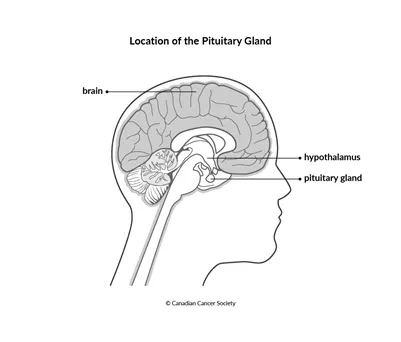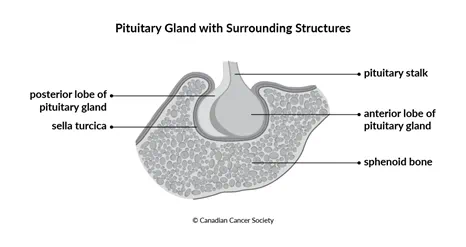The pituitary gland
The pituitary gland is a small, pea-sized
The pituitary gland is behind the nasal cavity and lies just above a

The pituitary gland is divided into 2 parts (lobes). The front part closer to the face is called the anterior pituitary gland. The back part is called the posterior pituitary gland, and it is closer to the back of the head. The pituitary gland is surrounded by bone (sphenoid bone), and it sits in a pouch called the sella turcica.

Pituitary gland hormones
The pituitary gland makes 9 different hormones. Both the anterior pituitary gland and the posterior pituitary gland make hormones.
Anterior pituitary gland hormones
The following hormones are made by the anterior pituitary gland:
Adrenocorticotrophic hormone (ACTH) tells the adrenal glands to make cortisol and other steroid hormones. Cortisol has many different jobs, such as controlling blood sugar levels and helping the body respond to stress. ACTH is also called corticotropin.
Growth hormone promotes the growth of all tissues of the body, including bones and muscles. It is needed for normal growth in children. It helps maintain body tissues in adults. Growth hormone is also called somatotropin.
Thyroid-stimulating hormone (TSH) encourages the thyroid to make and release hormones that control growth, body temperature and heart rate and change food into energy. TSH is also called thyrotropin.
Follicle-stimulating hormone (FSH)
and
luteinizing hormone (LH)
control the sex organs. In women, FSH and LH tell the ovaries to make the
female sex hormones
Prolactin stimulates breasts to develop and make milk after childbirth. Prolactin is also called lactotropin.
Melanocyte-stimulating hormone (MSH) causes certain cells of the skin (called melanocytes) to make melanin, which is the substance that gives skin its colour and helps protect the body from some of the harmful effects of the sun.
Posterior pituitary gland hormones
The following hormones are made by the posterior pituitary gland:
Antidiuretic hormone (ADH) keeps water in the body so that it’s not all lost. It lowers the amount of urine the kidneys make and helps control blood pressure. ADH is also called vasopressin.
Oxytocin
instructs the
Your trusted source for accurate cancer information
With support from readers like you, we can continue to provide the highest quality cancer information for over 100 types of cancer.
We’re here to ensure easy access to accurate cancer information for you and the millions of people who visit this website every year. But we can’t do it alone.
Every donation helps fund reliable cancer information, compassionate support services and the most promising research. Please give today because every contribution counts. Thank you.
